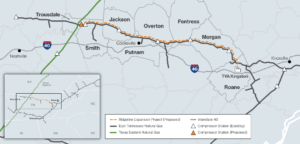
The Tennessee Valley Authority is planning a gas plant and pipeline project in Kingston.
Tennessee residents, over many years, will pay for it.
But should they?
The fossil fuel project is not a good investment, economically or morally, according to Nashville’s political leaders.
Mayor John Cooper’s office formally opposed the Kingston project this week in written comments to TVA, citing long-term economic risks, climate change and the viability of clean alternatives.
“If we are to ask our city’s residents to pay for a major investment in replacing (Kingston), it should be in renewables and storage,” the office wrote. “TVA needs to serve as a leader in addressing the existential threat of climate change.”
 Courtesy Enbridge
Courtesy Enbridge Under TVA’s Kingston proposal, Enbridge would construct a 122-mile pipeline that cut through eight counties.
In Kingston, a town about 30 minutes west of Knoxville and the site of the nation’s worst coal ash spill, TVA is planning to replace its old coal plant with 1.5 gigawatts of methane gas facilities, including one traditional gas plant and 16 peaker plants, a small solar farm — about .2% of the total project — and a storage facility.
The project will also include a 122-mile pipeline, which the mayor’s office said, as it did in comments on TVA’s 1.5-GW Cumberland gas project, would “stand as a stark symbol that TVA is doubling down on the fuels that have led to our climate crisis.”
‘Nashvillians on the hook to pay for further pollution’
TVA calls the project the “best overall solution to provide low-cost, reliable energy to the TVA power system.”
In the past decade, major blackouts, including TVA’s Arctic incident in December, have been challenging the narrative that gas is reliable. Gas accounts for a disproportionate share of power outages in the U.S., Bloomberg reported last week.
TVA has not shared the Kingston project costs yet, but the TVA Board has approved $3.5 billion for both the Kingston and Cumberland projects, according to TVA’s latest 10-K filing.
Gas could become more expensive soon. In May, the Environmental Protection Agency proposed a rule that would require large gas plants to capture 90% of their carbon emissions or have 30% hydrogen use by 2035 — or close early.
 Courtesy Peter Beukema/Unsplash
Courtesy Peter Beukema/Unsplash The Inflation Reduction Act allows public utilities like the Tennessee Valley Authority to invest in renewables with tax credits, such as the U.S. production tax credit.
“The lifespan of the proposed plants undermines any cost-based argument made by the TVA,” the mayor’s office comments read. “Leaving Nashvillians on the hook to pay for further pollution is unacceptable.”
Wind and solar are cost-competitive with gas. From a climate perspective, gas is much more expensive than renewable options. For the Kingston project, the total social costs of greenhouse gas emissions for gas would be about $6 billion more than for solar, based on one of TVA’s own calculations. But, given that TVA cites the American Gas Association for the estimated climate pollution released by fracking and pipelines and not the latest science, the climate cost is likely much higher.
NES Board says TVA’s gas plans threaten business
The Nashville Electric Service board has also publicly opposed the Kingston project. The board submitted comments last week asking TVA to focus on renewables to make Nashville more competitive with other big American cities.
The board emphasized concerns for business since most companies are considering local energy in their environmental, social and governance, or ESG, portfolios.
“The lack of clean, renewable energy places NES and the Nashville region at a competitive business disadvantage in attracting more businesses to the Middle Tennessee area,” the board wrote.
Vanderbilt University and the Metro Nashville government, NES’ largest industrial and government customers, have been able to hit sustainability targets because of “100 percent customer investment,” but smaller business customers “without significant resources do not have the choice or option to consume environmentally sustainable power,” the board wrote.
TVA power is nearly 50% fossil fuels
In 2022, nearly half of TVA’s power came from fossil fuels.
TVA has proposed about 4 GW of new gas in the past year, between the Cumberland, Kingston and Cheatham projects. The three pipelines required for these projects equate to more than half the length of the Mountain Valley Pipeline, a 300-mile project that was recently approved through a congressional deal following significant pushback.
The utility is also currently constructing another 2 GW of gas at its sites in New Johnsonville; Paradise, Ky.; and Colbert, Ala.
Together, the gas projects are equivalent to more than 15% of the utility’s current capacity of 38 GW.

